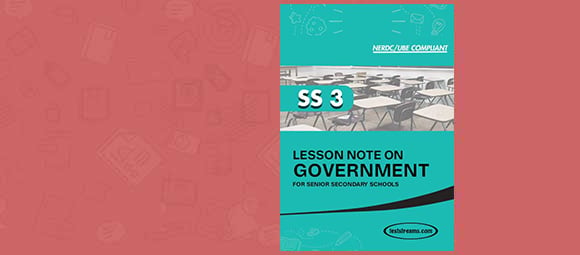This FINANCIAL ACCOUNTING Lesson Note was pulled from our book (Lesson Note on FINANCIAL ACCOUNTING for SS1 MS-WORD); Compiled to serve as reference material to help teachers draw out their lesson plan easier, saving you valuable time to focus on the core job of teaching.
This FINANCIAL ACCOUNTING Lesson Note Covers The Following Topics
- BOOK-KEEPING
- ACCOUNTING CONCEPT AND CONVENTION
- WDOUBLE ENTRY
- SOURCE DOCUMENT AND SUBSIDIARY BOOKS
- SUBSIDIARY BOOKS
- WORKING EXERCISES ON SALES DAY BOOK AND RETURN INWARD JOURNAL
- LEDGERS
- ONE CASH CASH BOOK
- DOUBLE COLUMN CASH BOOK
- DISCOUNTS
- THREE COLUMN CASH BOOK
- PETTY-CASH BOOK
- POSTING SUBSIDIARY BOOKS INTO LEDGERS
- TRIAL BALANCE
- TRADING ACCOUNT
- PROFIT AND LOSS ACCOUNT
- BALANCE SHEET
- PREPARATION OF BANK RECONCILIATION ACCOUNT
- PREPARATION OF BANK RECONCILIATION WHEN THERE IS BANK OVERDRAFT
- UNDERSTANDING THE END OF THE YEAR ADJUSTMENT IN PROFIT AND LOSS ACCOUNTS
- PROVISION FOR BAD DEBT AND PROVISION FOR DISCOUNT ALLOWED AND RECEIVED
- BAD DEBTS RECOVERED
- DEPLETION OF FIXED ASSETS
- STRAIGHT-LINE METHOD
- TREATMENT OF DEPRECIATION IN PROFIT AND LOSS ACCOUNTS AND BALANCE SHEET
Sample note
Week 1
TOPIC : Book-Keeping
Meaning of book-keeping
It can be defined as the the system of recording transaction in business on a daily basis in appropriate book,it is an integral part of account. It can also be defined as the process of recording, selecting, classifying, interpreting and communicating financial data of an organization to enable users to make decision. Accounting involve measurement and reporting of organization profit and loss.
History of Accounting in Nigeria
The institutionalization of Accounting started in Britain, from where Accounting was imported to Nigeria. During the pre-independence period, in Nigeria, especially before the establishment of the Collages of Arts and Sciences (particularly the one in Ibadan), people who wanted to enroll into accounting profession had to be trained through article ship. This meant that, they had to be attached as apprentices to those in the profession already. When the College of Arts and Sciences in Ibadan (now university of Ibadan) was established, it offered courses in accounting; students were prepared for the intermediate level of ACCA (Chartered Association of Certified Accountants), a British Accounting Body.
In 1960, the University of Nigeria Nsukka started offering courses in accounting, the Ahmadu Bello University, Zaria and the University of Lagos joined in offering accounting courses form 1962. Other Nigerian Universities (most of them) and many polytechnics follow suit in the later years. Together they produce large number of accounting graduates (B. Sc. And HND holders) year in year out!
In 1960, specifically on 17th November, some Nigerians who had some professional training in accounting from different parts of the world, got together and formed an association called Association of Nigerian Accountants. This was the first attempt at forming a national and indigenous accountancy professional body in Nigeria. It included people working in companies, industries, government offices, etc. The Association was formed with the view to provide and maintain a high standard of accounting in Nigeria.
The Association was granted official recognition by the Federal Government of Nigeria on 28th September 1965 with the name Institute of Chartered Accountants of Nigeria (ICAN), through an Act of parliament, Act No. 15 of 1965. ICAN was then inaugurated on 21st October 1965.
Importance of Accounting and book-keeping
The record shows income and expenditure
The record provides a means by which the finance of business are controlled
It helps to prevent fraudulent practices
It helps to determine the profitability of business concern
They are used for tax Assessment
It provide permanent record for all transaction
It can be use for decision making
The record also shown the asset and liability of the business.
Users of Accounting Information
Principal uses of accounting information are-
Managers’
Employee
The public
Investors
Government
Directors
Analyst
Career Opportunities in Book-Keeping and Accounting
The following are career prospects for people who studied Accounting-
Accountant
Accounting Assistant
Accounting Clerk
Accounting Manager
Accounts Payable Clerk
Accounts Receivable Clerk
Book-keeping
Budget Analyst
Certified Internal Auditor
Chief Financial Officer – CFO
Comptroller/Controller
Forensic Accounting
Government Accounting
Payroll Clerk
Staff Accountant
Tax Accountant
Benefits of Book-keeping and Accounting
The following are the benefit of Book-Keeping and Accounting-
It shows purchases and sales made within a given period
It provides a written record which is essential for the proper conduct of business
Good book keeping practices enables one to ascertain the profit or loss made during a trading period
The existence of reliable financial records helps in management decision -making
It facilitates reference making to past transaction
Limitation to Accounting Information
There is no information as to usefulness, size or quantity because accounting is expressed in monetary terms
Accounting information is historical in nature i.e. recording is after the event
Accounting Professional Bodies
Association of Financial and Management Accounts of Nigeria (AFMAN)
Association of National Accountants of Nigeria
Chartered Institute of Management Accountants of Nigeria
Institute of Certified Public Accountants of Nigeria (ICPAN)
Institute of Chartered Accountants of Nigeria

Get the complete Lesson Note with more content at very affordable price. Lesson Note on FINANCIAL ACCOUNTING for SS1 MS-WORD- PDF
![]()



